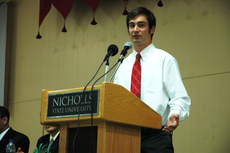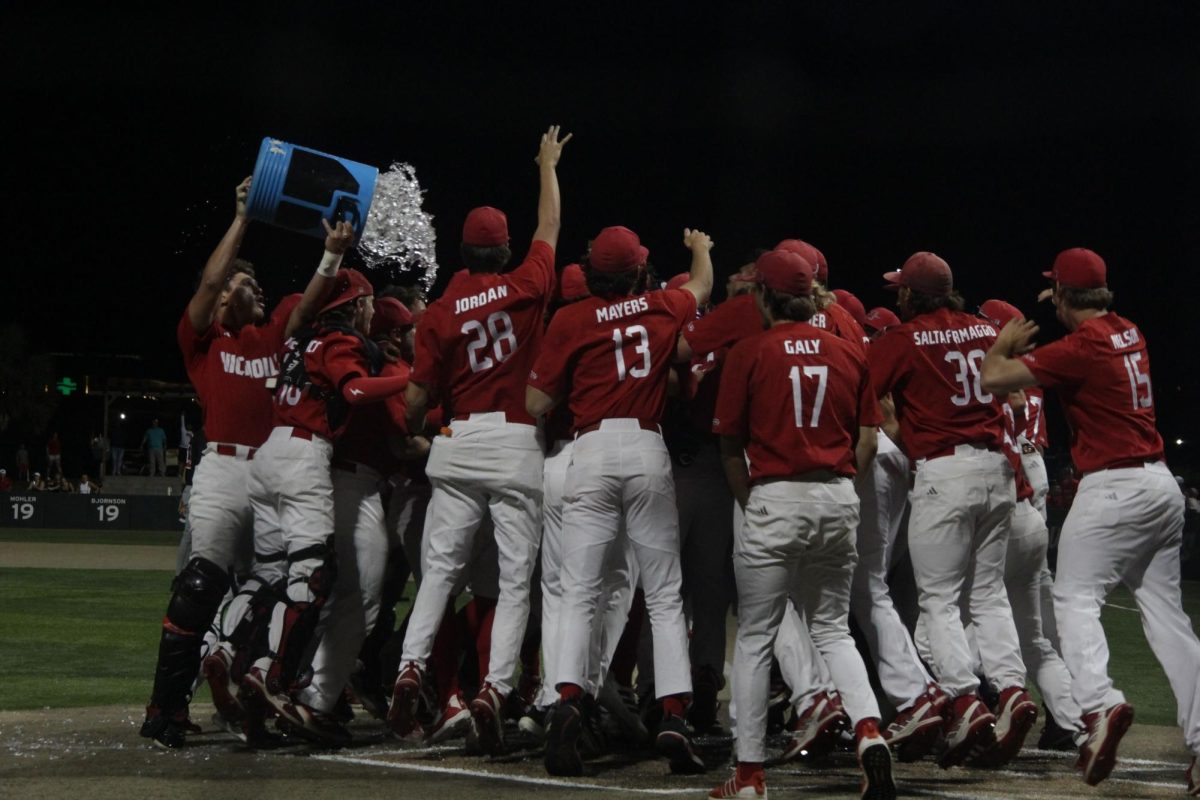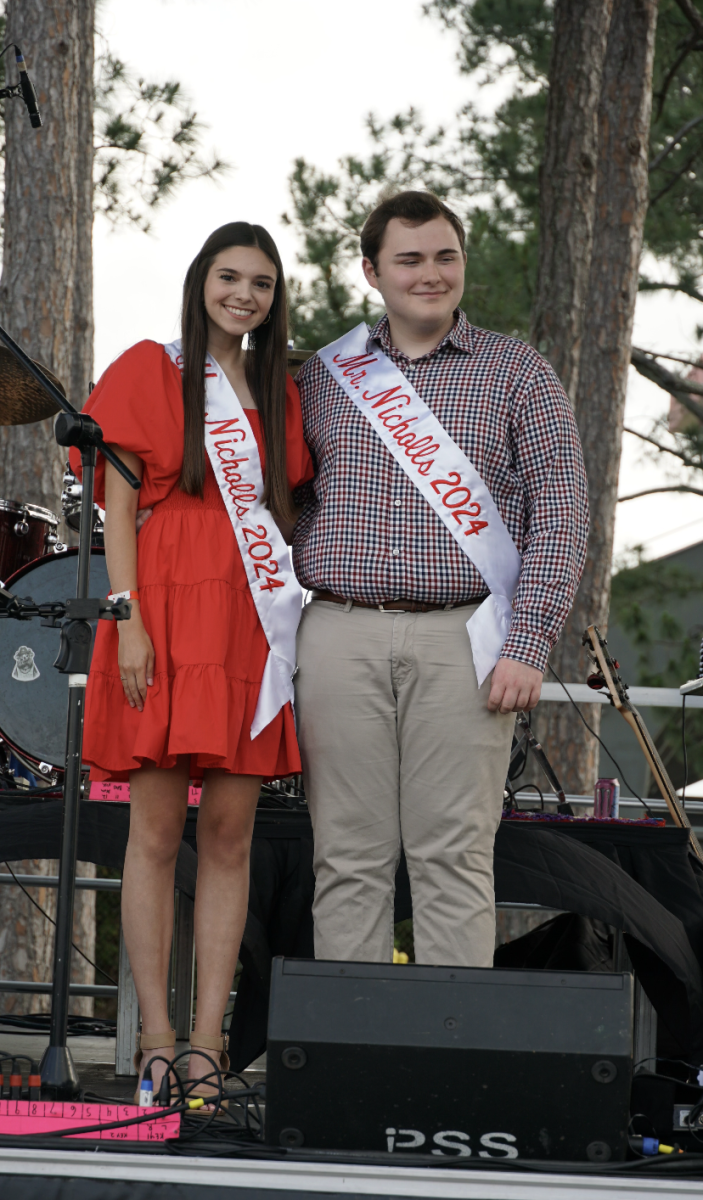Students against the public option for health care reform won 181 to 130 at the speech forum Tuesday.The forum’s topic was “Resolved, that if America is to reform health care, the public option should remain in any legislation.” Dustin Schultz, general studies junior from Thibodaux, spoke for the pro side.
“We are here to make a choice between action and inaction, a choice between our health and complacency,” Schultz said. “Public option is the most coherent and comprehensive choice that we can make to improve our nation’s health care.”
Schultz said the public option would create an independent, non-profit insurance provider regulated by the federal government. “This is designed to give Americans the option to purchase affordable health care, regardless of their medical history,” he said. “All Americans are eligible, and no one can be denied health care.”
Schultz spoke against the way insurance companies operate under the current system. “Some insurance companies hire private investigators to sift through the medical records of clients who have made large claims to look for any pre-existing condition on which they can base denial,” he said. “The public option will operate just like any other insurance company except no denials will be issued, and no one will be sitting at the top gleaning profits from our misery.”
Schultz concluded his argument by saying the country is afraid of change. “We voted for change last November, but right now, it’s hard to tell,” Schultz said. “We must act now to save our own lives.”
Devin Bourgeois, freshman from Thibodaux, began his argument for the con side by saying the public option is too expensive, complicated and unknown.
Bourgeois said people would overuse health services if the public option remains. “This will result in packed waiting rooms and longer wait times,” he said. “With the government in control, doctors will have less leeway to use judgment on professional care.”
Bourgeois said President Obama’s claims that people would be able to maintain coverage they already have would not be accurate with the public option. “With the increase of regulations put on our insurance companies, I believe the insurance they would want to keep will no longer exist,” he said. “People with healthy lifestyles will have to pay higher taxes for those who choose to lead unhealthy lifestyles.” Bourgeois said placing a tax on fast food would be closer to paying for a better health care system.
After both speakers presented, audience members were allowed to speak.
Peter Jenkins, government sophomore from Thibodaux, said he took issue with some of the information presented by Bourgeois. “America doesn’t have the ‘best health care system in the world,'” Jenkins said. “Instead, the country is rated 36th in the world.”
Jim Godin, government senior from Galliano, received applause from the crowd when he said he was from Canada. “It’s true Canada has its own problems with health care,” Godin said. “There is a lot of wait time, but what I don’t think a lot of people recognize is that United States has a golden opportunity to revolutionize the system: to take the best from the health care system and the best from private insurance and put them together to create a system that works for everyone.”
Lily Barber, biology sophomore from St. Francisville, said she is concerned about the government taking over health care. “I may have a child that may have a 90 percent chance not to survive its first week, but there is a 10 percent chance that it may. Does the government say our money is better spent on the baby that has a 60 percent chance?” Barber said.
Rachel Robinson, freshman from Slidell, said people are jumping on the government’s bandwagon. “This is America and we have freedom. Today it’s health care and tomorrow it’s going to be ‘you can’t have McDonalds,'” Robinson said. “Our choices are slowly dwindling away.” Robinson also compared universal health care to other government-run services. “The post offices, Medicare and other government programs are going bankrupt. Do you really want to trust them with your health care?”
Each side selected a speaker to make closing statements before voting.
Jenkins was picked to speak for the pro side and explained where the funding for universal health care would come from. “People who want to be in this program will pay like they do for regular insurance,” Jenkins said. “That is where a majority of the money will come from to help pay for this plan.”
He also spoke against the fear that the government would chose who receives proper treatment. “The government is never going to tell you ‘I’m sorry you’re not worth it’ or ‘we’re not going to let you live,'” Jenkins said. “They are not going to tell you what doctor to use or where your baby should be born and to help your fellow man.”
The con side chose Jonathan Lynch, culinary junior from Ruston, to speak on its behalf. Lynch began his argument by quoting Notorious B.I.G.’s lyrics, “More money, more problems,” and said the debate is all about money. “It comes down to putting money towards a program you think will work or won’t work,” Lynch said. “I’m not willing for my money or my children’s money to pay for people who aren’t willing to seek out a better life for themselves.



![Assistant coach Cody Livingston [#53] talking with pitcher Nico Saltaformaggio [#38] on the mound(5/12).](https://thenichollsworth.com/wp-content/uploads/2024/05/LivingstonNicoHuddle-vs-Lamar-1200x800.jpg)




